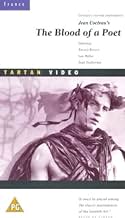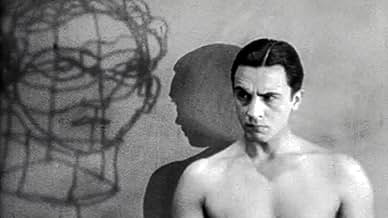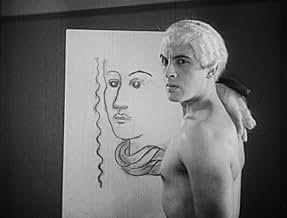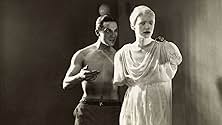CALIFICACIÓN DE IMDb
7.2/10
7.7 k
TU CALIFICACIÓN
Uno de los grandes experimentos del cine, esta primera entrega de la Trilogía Órfica lleva el medio hasta sus límites en un esfuerzo por capturar la obsesión del poeta con la lucha entre las... Leer todoUno de los grandes experimentos del cine, esta primera entrega de la Trilogía Órfica lleva el medio hasta sus límites en un esfuerzo por capturar la obsesión del poeta con la lucha entre las fuerzas de la vida y la muerte.Uno de los grandes experimentos del cine, esta primera entrega de la Trilogía Órfica lleva el medio hasta sus límites en un esfuerzo por capturar la obsesión del poeta con la lucha entre las fuerzas de la vida y la muerte.
- Dirección
- Guionista
- Elenco
- Premios
- 1 premio ganado en total
- Dirección
- Guionista
- Todo el elenco y el equipo
- Producción, taquilla y más en IMDbPro
Opiniones destacadas
Surrealist cinema was at the height of its powers between the mid 1920's to the mid 1930's. For obvious reasons, the silent era had been particularly well suited to visually strong films. Like Luis Buñuel's L'âge d'or, The Blood of a Poet is one of the later films from this period. And both incorporate limited sound. In the case of this movie it is mainly music, with a little synchronised dialogue. It's a film that gives the impression of having an overall purpose and meaning but I have to admit, I really have no idea what it was. I found it baffling but interesting enough in a strange dream-like way. And at 50 minutes it hardly overstays its welcome. It's consistently well photographed and there are memorable sequences such as the hotel of strange rooms and the falling into a mirror moment. So, mainly, the film was of interest to me as an example of creative surrealism. But as to what it means? Ah, well, your own your own there I'm afraid
Cocteau's first feature certainly reflects the early idealism of cinema, that "we can do it!" spirit that made early artists truly believe in the potential of cinema as a medium to trump all other arts. Thematically similar to the more famous surrealist work "Un chien Andalou," "Le sang d'un poete" is a chroma-key free-for all, with talking hands, statues that come to life, and banal bourgeoise cardgames transpiring on children's corpses. It's hard to watch at times, made even harder by what I think is a terribly distracting score (to the point where I just turned the sound off and enjoyed the film as a silent with subtitles.) However, by the end one realises Cocteau's heartfelt audacity, and the true spirit of the early cinema artists who wanted to do things with film that nobody has the cojones to try today.
A seminal work in experimentalist cinema; why does it seem like we've fallen way behind?
A seminal work in experimentalist cinema; why does it seem like we've fallen way behind?
This film could very well have been made in collaboration with Luis Bunuel (Un Chien Andalou '29, L'Age D'Or '30), but it is less experimental and I don't think Cocteau takes full advantage of the screen time: the pace is low and there are no really shocking elements. I have to admit it could be a little shorter (despite it's only 60 minutes). That's not because Cocteau really needs much time, but because it's just slow. But then again, aren't most of his films and does it matter? The cinematography in by Georges Perinal (Le Million, The Fallen Idol) and the music sufficiently contribute to the fabulous imagery. See this film.
There is a similar snowball-throwing scene in this film which was used also in 'Les Enfants Terrible' (Melville, 1950) which was also written by Cocteau as you can see from the title sequence, and was created by Jean-Pierre Melville (Le Samourai, Un Flic) with the famous Cocteau-atmosphere.
10 points out of 10 :-)
There is a similar snowball-throwing scene in this film which was used also in 'Les Enfants Terrible' (Melville, 1950) which was also written by Cocteau as you can see from the title sequence, and was created by Jean-Pierre Melville (Le Samourai, Un Flic) with the famous Cocteau-atmosphere.
10 points out of 10 :-)
The Surrealist movement, as an artistic revolution has been utterly dominated by the name Salvador Dali at least in popular culture. Those in the know may be able to list a few other artists such as Roberto Matta or Max Ernst; perhaps make a tentative connection between Surrealism and Cubism and by extension Pablo Picasso. Even fewer people realize Surrealism has left an indelible impact on film which still seeps into the unconscious of many a-movie. Luis Bunuel's Un Chien Andalou (1929) stands as one obvious example but while Bunuel's career is infamous within cinema circles, many people don't consider French director, writer, and all around renaissance man Jean Cocteau to be part of the movement.
The Blood of a Poet is the first part of Jean Cocteau's Orpheus Trilogy (1932-1960); a loosely connected telling and re-telling of the well-known Greek legend. In this installment, our poet (Rivero) stands in a studio, painting on a canvas with the intensity seen in the most obsessive of human beings. His creations start to come to life, first the paintings then the sculptures. As he discovers the dreamlike dimensions of the room and it's contents, the poet goes into a fugue state falling through mirrors and peering through keyholes. The film ends with the destruction of a factory-type tower or smokestack precipitated by the constant appearance of a muse like figure. By the end she's lying in darkness with a lyre and a globe symbolizing Erato the muse of lyric poetry or maybe Urania the muse of astronomy.
Jean Cocteau is arguably most known for his poetry though he's dabbled in theatre, novel writing and of course film. In the realm of cinema his crowning accomplishment is The Beauty and the Beast (1946) which showed remarkable economy in storytelling and in special-effects. The Blood of a Poet however is a 55 minute concentrated dose of Cocteau at his most creative. Few films today can catapult it's audience into the outer limits of cinematic artistry and with today's spreadsheet, bottom-line obsessed studios there is simply no room for experimentation. Yet in 1930, one man was seemingly given unlimited resources to play with the form and unlike Bunuel's aforementioned Un Chien Andalou and L'Age d'Or (1930), Cocteau's oeuvre concentrates on the sublime not on the grotesque. Interesting to note that Cocteau had been dubbed by his contemporaries "The Frivolous Prince," for his bohemian lifestyle and romantic view of poetry. It certainly shows here.
Those who lived prior to the films release accused it of being anti- religious and delayed its release by two years. Modern skeptics complain that the film is incredibly pretentious and others still, express it is aggressively political in nature. They're not wrong; all the above can be true and false depending on your attitude and disposition. If you're one to take artist intent into consideration Cocteau wrote an essay on The Blood of a Poet contending that it is not a surreal film at all! But rather an attempt to "...avoid the deliberate manifestations of the unconscious in favor of a kind of half-sleep through which I wandered as though in a labyrinth." As with all surreal artwork, the film is ultimately an exercise in personal interpretation.
What remains certain is The Blood of a Poet packs more themes, more story, more experimentation and more beauty in it's scant screen- time than most TV-series' put into their entire run. The ingenuity and raw emotional power embedded in this film is stunning and are sure to bedevil you in your daydreams and in your sleep. I truly, in my heart of hearts believe The Blood of a Poet to be the ideal first film for those wishing to delve into Surrealism. Of course that's just my interpretation; I suppose that's the point.
The Blood of a Poet is the first part of Jean Cocteau's Orpheus Trilogy (1932-1960); a loosely connected telling and re-telling of the well-known Greek legend. In this installment, our poet (Rivero) stands in a studio, painting on a canvas with the intensity seen in the most obsessive of human beings. His creations start to come to life, first the paintings then the sculptures. As he discovers the dreamlike dimensions of the room and it's contents, the poet goes into a fugue state falling through mirrors and peering through keyholes. The film ends with the destruction of a factory-type tower or smokestack precipitated by the constant appearance of a muse like figure. By the end she's lying in darkness with a lyre and a globe symbolizing Erato the muse of lyric poetry or maybe Urania the muse of astronomy.
Jean Cocteau is arguably most known for his poetry though he's dabbled in theatre, novel writing and of course film. In the realm of cinema his crowning accomplishment is The Beauty and the Beast (1946) which showed remarkable economy in storytelling and in special-effects. The Blood of a Poet however is a 55 minute concentrated dose of Cocteau at his most creative. Few films today can catapult it's audience into the outer limits of cinematic artistry and with today's spreadsheet, bottom-line obsessed studios there is simply no room for experimentation. Yet in 1930, one man was seemingly given unlimited resources to play with the form and unlike Bunuel's aforementioned Un Chien Andalou and L'Age d'Or (1930), Cocteau's oeuvre concentrates on the sublime not on the grotesque. Interesting to note that Cocteau had been dubbed by his contemporaries "The Frivolous Prince," for his bohemian lifestyle and romantic view of poetry. It certainly shows here.
Those who lived prior to the films release accused it of being anti- religious and delayed its release by two years. Modern skeptics complain that the film is incredibly pretentious and others still, express it is aggressively political in nature. They're not wrong; all the above can be true and false depending on your attitude and disposition. If you're one to take artist intent into consideration Cocteau wrote an essay on The Blood of a Poet contending that it is not a surreal film at all! But rather an attempt to "...avoid the deliberate manifestations of the unconscious in favor of a kind of half-sleep through which I wandered as though in a labyrinth." As with all surreal artwork, the film is ultimately an exercise in personal interpretation.
What remains certain is The Blood of a Poet packs more themes, more story, more experimentation and more beauty in it's scant screen- time than most TV-series' put into their entire run. The ingenuity and raw emotional power embedded in this film is stunning and are sure to bedevil you in your daydreams and in your sleep. I truly, in my heart of hearts believe The Blood of a Poet to be the ideal first film for those wishing to delve into Surrealism. Of course that's just my interpretation; I suppose that's the point.
I watched "Blood Of A Poet" right after Bunuel's (and Dali's) "Un Chien Andalou" and "L'Age D'Or"; it comes a distant third. It is totally inaccessible (whereas Bunuel's films are equally bizarre but I felt like I was connecting some dots - if perhaps not in the ways that he would have wanted me to!), and pompously self-important (whereas the others are generally playful). It is also blatantly homoerotic - fixated on two strapping, muscular, bare-chested men, one white, one black (not saying that's a good or a bad thing, but it's definitely there). Some impressive photographic tricks cannot sustain even 50 minutes. I didn't understand this film, it didn't make me feel anything, and it didn't entertain me; I gave it a second try, and I liked it even less! But hey, art is subjective, maybe others will get something out of it that I missed (twice). ** out of 4.
¿Sabías que…?
- TriviaBecause of the October 1930 scandal around Luis Buñuel's La edad de oro (1930) - another film financed by Le Vicomte de Noailles and Marie-Laure de Noailles, the Paris premiere of this film was delayed until January 1932.
- ConexionesFeatured in Jean Cocteau: Autoportrait d'un inconnu (1983)
Selecciones populares
Inicia sesión para calificar y agrega a la lista de videos para obtener recomendaciones personalizadas
- How long is The Blood of a Poet?Con tecnología de Alexa
Detalles
- Tiempo de ejecución55 minutos
- Color
- Relación de aspecto
- 1.37 : 1
Contribuir a esta página
Sugiere una edición o agrega el contenido que falta

Principales brechas de datos
By what name was Le sang d'un poète (1932) officially released in India in English?
Responda























